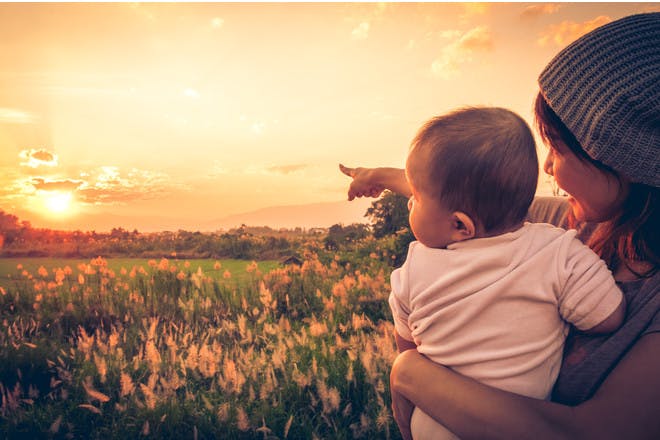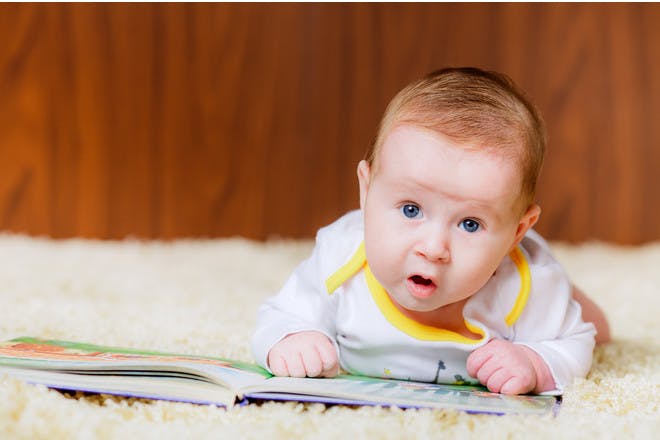How to encourage your baby’s first words
Promotion

You may think her cooing and babbling are just noises, but your baby is trying to talk to you. Here’s why her noises are so important, and how you can help her to form her first words …
It’s good to talk
From the day she’s born, talk to her. Hold her close and use eye contact.
You may feel a little silly at first, but babies need to understand words before they can speak, so talking to her will help establish the connection in her brain.
Don’t be worried about talking in ‘baby talk’ to her either. There may be a reason that sing-song voice and those exaggerated vowels come out of nowhere (you didn’t speak like that at work!). Studies show that babies who have lots of one-to-one baby talk from parents babble more (a precursor to speaking) when they’re 12 months.
FREE NEWBORN NAPPIES
Ask questions
By the time she’s six weeks old, she’ll be taking more of an interest in things around her, so start asking her questions: ‘Are you hungry?’, ‘Would you like some milk?’
And point things out to her – ‘Look, there’s a cat’, ‘Grandma is here’. As she gets older, add more detail: ‘Look at that red car’, ‘What a noisy dog!’
Be a copy cat
At around three to four months, those heart-melting oohs and ahhs may begin to develop into babbling, where she starts to play around with consonant sounds, like babababa, dadadada.
Try copying the sounds she makes. This will not only encourage her to make more, but will also start to teach her about conversation. Wait until she finishes her ‘sentence’ then make the same noises back to her.

Express yourself
As she gets to grips with babbling sounds, you’ll notice she starts to add different tones to her chattering.
By six months she’ll be able to recognise anger or excitement in your voice and will also develop various noises to get your attention or let you know if she’s hungry.
Acknowledging her noises and talking back to her will delight her, and this is the time she’ll really start to revel in the sound of her own voice!
Rhymes and songs
There’s a good reason that every culture has its own rhymes and songs for young children – this teaches them about patterns of speech.
It doesn’t matter that you haven’t got the voice of an X-Factor winner; your baby will love it when you sing.
And if you don’t know the words to nursery rhymes, then singing along to Adele will do just fine – and you can learn the words to Wind the Bobbin Up at local library rhyme times later on.
Further down the line, understanding that words can start or end with the same sound will help your child enormously when it comes to learning to read using phonics at school.
Be a book worm
Babies love books, so start looking at them together from the start. You don’t even need to read the words – bright picture books will fascinate young babies and you can point to things in the pictures. Check out these top board books for babies and best books for one year olds.
Repeating the names of things will help babies understand that words have meaning.

Build vocabulary
By the time she’s a year old she may well have mastered a few words.
It’s a crucial time to be really positive and encourage her. So if she gets something wrong – for example, she says ‘dod’ – then don’t criticise and tell her it’s wrong; instead, say ‘yes, it’s a dog’.
You can help to build her vocabulary by giving her choices and encouraging her to use words other than yes or no. For example, ‘Would you like apple or banana?’ or ‘Would you like the teddy or the baby?’
Signing can help
Waving, pointing and other hand gestures are communication, too, and by the time she’s a year old you may find that she’s pointing at things she wants or is interested in.
She may well have mastered shaking her head when it’s something she doesn’t want, too! Some mums find baby signing can be helpful in encouraging babies to communicate before they can speak.
Give her time
By the age of two she may have started putting words together and even forming simple sentences.
Make sure you give her lots of time to talk. If you ask her a question, wait patiently for her answer, and try not to butt in if she’s struggling to find a word.
Allow lots of time for talking – television can be very distracting, so turn it off if you’re going to have a conversation. If she uses a dummy, try to restrict it to when it’s time for sleep, because it’s hard to talk with a dummy in your mouth.
Bathtime can be a great chance to have a chat, and you can use bath toys to help learn new words and colours ,for example. Before you know it, you’ll have a little chatterbox on your hands – so better start thinking of answers to the ‘but why…?’ stage now!